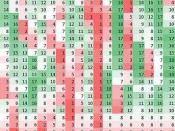Wage Discrimination in the Workplace
Labor Relations
March 2004
Whether you are male or female, most Americans seem to think that quality jobs are difficult to obtain at this time. However, it appears that more women than men are skeptical about their job prospects. As of March 2, 2004, the U.S. Bureau of Labor Statistics reports that the 2003 annual unemployment rate standing at 6.0% is at its highest point since 1994 when it hit 6.1%. In 2000, the rate was 4.0% therefore having risen 50% in the short period of only three years. As this change has been so dramatic, it is not surprising that we numerous Americans are pessimistic about job prospects.
Telephone interviews were given to 1,004 adults aged 18 and over between January 12th and 15th this year. More interviews were conducted between the dates of February 9th and 12th covering another 1,002 adults. These surveys included 997 men and a total of 1,009 women.
Sixty-nine percent of those polled believe that current times are proving to be difficult to find quality jobs. Women, in particular, were the most pessimistic members of the poll group.
There are many theories as to why women may feel this way. It has been stated numerous times that women tend to have lower levels of confidence than men regarding their own self-efficacy. The theory that even I subscribe to, is that women tend to earn lower wages than men in the same positions. In my own personal experience it appears that women who might complain about this situation are labeled as whiners. Feminists have often lectured these same women to quit complaining and acting like a victim, many men might laugh and tell the women to suck in their gut and play some golf, while magazines tell women to do...


